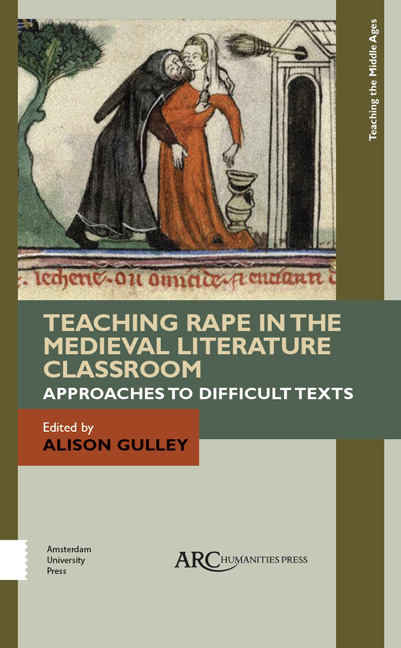Book contents
- Frontmatter
- Contents
- Acknowledgements
- Chapter 1 Introduction: Teaching Rape and Meeting the Challenges of the TwentyFirstCentury Classroom
- Chapter 2 Medieval Saints and Misogynist Times: Transhistorical Perspectives on Sexual Violence in the Undergraduate Classroom
- Chapter 3 Teaching Medieval Rape Culture across Genre: Insights from Victimology
- Chapter 4 Bringing the Bystander into the Humanities Classroom: Reading Ancient, Patristic, and Medieval Texts on the Continuum of Violence
- Chapter 5 From Bystander to Upstander: Reading the Nibelungenlied to Resist Rape Culture
- Chapter 6 Speech, Silence, and Teaching Chaucer’s Rapes
- Chapter 7 Classroom PSA: Values, Law, and Ethics in “The Reeve’s Tale”
- Chapter 8 “How do we know he really raped her?”: Using the BBC Canterbury Tales to Confront Student Skepticism towards the Wife of Bath
- Chapter 9 Teaching the Potiphar’s Wife Motif in Marie de France’s Lanval
- Chapter 10 Sexual Compulsion and Sexual Violence in the Lais of Marie de France
- Chapter 11 Troubadour Lyric, Fin’amors, and Rape Culture
- Chapter 12 The Knight Coerced: Two Cases of Raped Men in Chivalric Romance
- Chapter 13 Teaching Rape to the HeMan Woman Haters Club: Chrétien de Troyes at a Military School
- Chapter 14 Rape, Identity, and Redemption: Teaching “Sir Gowther” in the Community College Classroom
- Notes on Contributors
- Index
Chapter 3 - Teaching Medieval Rape Culture across Genre: Insights from Victimology
Published online by Cambridge University Press: 23 January 2021
- Frontmatter
- Contents
- Acknowledgements
- Chapter 1 Introduction: Teaching Rape and Meeting the Challenges of the TwentyFirstCentury Classroom
- Chapter 2 Medieval Saints and Misogynist Times: Transhistorical Perspectives on Sexual Violence in the Undergraduate Classroom
- Chapter 3 Teaching Medieval Rape Culture across Genre: Insights from Victimology
- Chapter 4 Bringing the Bystander into the Humanities Classroom: Reading Ancient, Patristic, and Medieval Texts on the Continuum of Violence
- Chapter 5 From Bystander to Upstander: Reading the Nibelungenlied to Resist Rape Culture
- Chapter 6 Speech, Silence, and Teaching Chaucer’s Rapes
- Chapter 7 Classroom PSA: Values, Law, and Ethics in “The Reeve’s Tale”
- Chapter 8 “How do we know he really raped her?”: Using the BBC Canterbury Tales to Confront Student Skepticism towards the Wife of Bath
- Chapter 9 Teaching the Potiphar’s Wife Motif in Marie de France’s Lanval
- Chapter 10 Sexual Compulsion and Sexual Violence in the Lais of Marie de France
- Chapter 11 Troubadour Lyric, Fin’amors, and Rape Culture
- Chapter 12 The Knight Coerced: Two Cases of Raped Men in Chivalric Romance
- Chapter 13 Teaching Rape to the HeMan Woman Haters Club: Chrétien de Troyes at a Military School
- Chapter 14 Rape, Identity, and Redemption: Teaching “Sir Gowther” in the Community College Classroom
- Notes on Contributors
- Index
Summary
For advanced undergraduates as for their instructors, medieval literary texts depicting victims and victimization present special interpretive challenges. Medieval texts stereotype and/ or typologize both victims and victimizers in terms of highly symbolic categories, beginning with categories of sex and class. Crimes against women in particular bear the hallmarks of medieval misogynistic discourse; moreover, when these crimes are sex crimes, medieval authors often depict both victimization and resistance to victimization (as in female saints’ lives) as ambiguously and aesthetically pleasing. In teaching undergraduates, there is a strong argument to be made that appreciating textual ambiguity is a skill to be fostered. At the same time, given the pressures already inherent in teaching required earlyperiod literature classes— beginning with the pressure on students to assimilate complex material— texts like those we draw on here may strike a given instructor as being simply more trouble than they are worth.
Yet, as is implicit in what we argue below, it is precisely their characteristic difficulties that may invest certain medieval texts involving rape with concrete utility to the undergraduate literature classroom. Kathryn Gravdal wrote of the pastourelle genre in 1991 that “[i] n two centuries of literary criticism, the sanguine representation of sexual violence in these songs has eluded analysis.” With the rise of internet culture, late twentiethand early twentyfirstcentury students have often encountered qualities similar to those Gravdal outlines for the pastourelle in pop culture, peer culture, and/ or social media. To cite but one example, knowyourmeme.com credits Chicago hip hop artist Twista's 2004 single “So Sexy” dedicated to women “that want to keep the D up inside of ‘em,” with originating the “D meme,” going on to trace the expression “She Wants The D” through porn sites to social media like the “She Wants The D” twitter feeds now popular with undergraduates. Here in a nutshell we have a literary ancestor of Robin Thicke's allegedly “rapey” summer pop hit “Blurred Lines” (2013) whose iterations of “I know you want it, I know you want it” remind us at least faintly of the thirteenthcentury pastourelles which Gravdal studied and categorized in terms of their depictions of rape, many involving stereotyped analogies between riding and sexual behaviour (chevauchant), jaunty trimeter, insistent monorhymes— all in the service of showing sexual victimization:
Et quant il en ot fait
Et quant il en ot fait
- Type
- Chapter
- Information
- Teaching Rape in the Medieval Literature ClassroomApproaches to Difficult Texts, pp. 29 - 46Publisher: Amsterdam University PressPrint publication year: 2018



